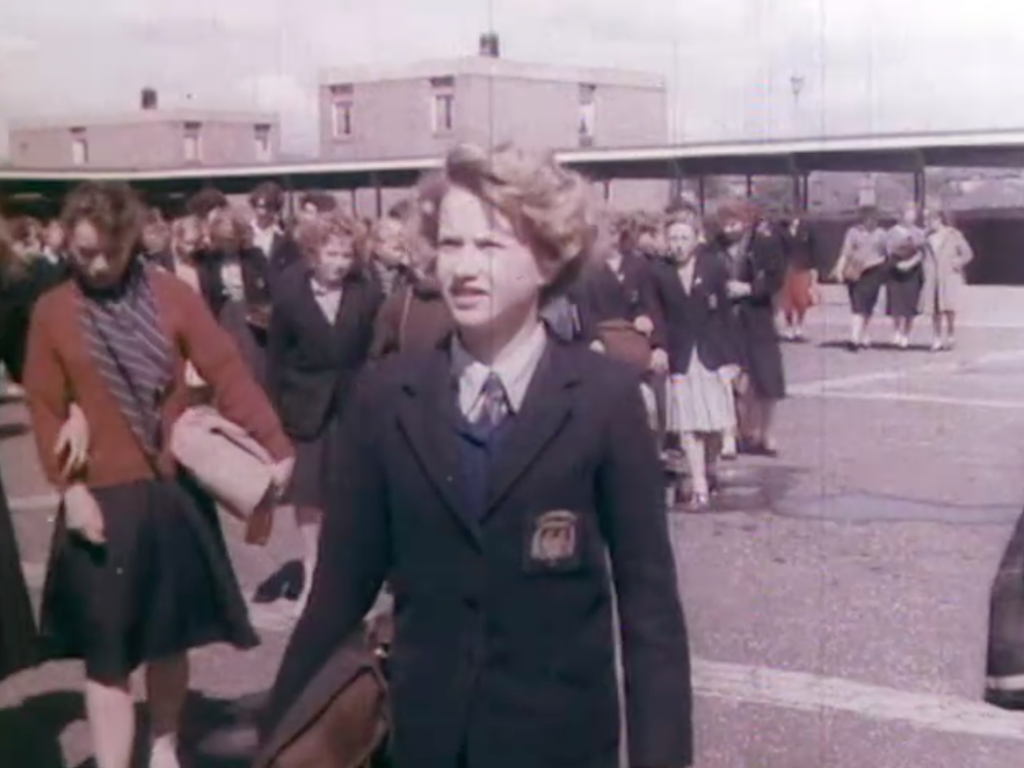Otley Secondary Modern School, 1960s
This a school-produced, silent film. It opens showing some records of Otley Board School in the 1870s, before transitioning to footage of new postwar buildings, classroom life, practical subjects, sports, music, art, and a school dramatic production.
Sexey’s School perform The Tempest, 1960
Pupils from Sexey’s school perform and are filmed in a production of William Shakespeare’s The Tempest. Founded in 1889, Sexey’s School in Bruton Somerset is named after Hugh Sexey who was appointed Royal auditor to Elizabeth I in 1599. In 1898 the school moved from its temporary premises on Quaperlake Street to its modern day site in 1898 and for many years it operated as a grammar school. Sexey’s is one of the largest co-educational state boarding schools in the country.

Watch this film for free here, via the BFI.
Our Three R’s, 1961
This public information film showcased Glasgow’s educational provision at the opening of the 1960s, from primary schools to further technical education. The film, ‘Our Three R’s’, followed Robbie, Ruth, and Roy through their different educational days. The film is narrated with a musical soundtrack. The film was sponsored by Educational Films of Scotland and was filmed at Cleddans Primary School, Knightswood Secondary School, and Stow College of Engineering.
Source: National Library of Scotland
The full length film is available to view online here, via the National Library of Scotland’s Moving Image Archive. The NLS has also produced a ‘Lesson Guide’ for teachers to use clips from their films in a lesson about ‘Experiences of School’ in Scotland, available here
Comprehensive School, 1962
This film presents a brave new world of British education to overseas viewers. What it neglects to mention is that the school it’s filmed at wasn’t just any old comp…Holland Park School, in wealthy London W8, was pretty much the flagship school for the whole comprehensive sector, sometimes dubbed the ‘socialist Eton’ due to Labour politicians’ tendency to send their children there. This film was part of a series called Looking at Britain, produced from 1958 to 1961. Commissioned by the Colonial Office through the COI, it was intended mainly for distribution to African countries and was little-seen by UK viewers. The films were made on fairly modest budgets by ‘economy’ production companies. Witness the rather barebones style of this one, its silent images illustrating colourless – though informative – prose. But as a time capsule of the cutting edge of state education in the early 60s it can’t be beat.

Watch the whole film, for free, here via the BFI.
Easter Mission to Denaby, 1962
Mexborough School students visit Denaby, a quintessential industrial village. Looming collieries, red bricked alleys and terraced housing present an archetypal snapshot of the coal mining community in a place once known as ‘Denaby Main Colliery Village.’ Whilst students embark on their project, knocking on doors and handing out leaflets, the teacher’s film shows an active industrial landscape – only a few years before the village’s dramatic rebuild.

Watch this film for free here, via the BFI.
School Visit to Falmouth, 1964
Pupils from a Teddington school visit Falmouth Town Hall and the mayor, Francis Offord. Falmouth is the world’s third largest natural deepwater harbour after Rio de Janeiro and Sydney and is the first and last port of call on one of the world’s busiest shipping lanes known as the Western Approaches. The port serves as an international bunkering or refuelling port because of restrictions on fuel emissions in Europe.

Watch this film for free here, via the BFI.
For Whom The Bell Rings, 1965
This is a school-produced film with a soundtrack including music, narration, and some classroom audio. It tracks a day in the life of Urmston Grammar School for Boys, from the bell ringing and assembly, moving to the classroom, gym, lab, canteen, punishment for graffiti, the workshop, and after school activities including drama and music.
Education for the Future, 1967
In 1967 the Labour Party Press Office had three ten-minute TV slots to fill, so they commissioned filmmaker Derrick Knight to experiment with something outside of the traditional party political broadcast. Deciding that education was the most pressing issue of the day, he focused on the David Lister High School in Kingston upon Hull and its charismatic headteacher Albert Rowe. The resulting documentary aimed to champion the cause of the relatively new comprehensive school system, illustrating the use of modern aids and disciplinary methods, and to challenge the assumption that its establishment would lead to a lowering of standards. Knight uses various stylistic approaches, such as hand-held camera, interviews and voice-over commentary, to present a concise showpiece for comprehensive education.

Watch this film for free here, via the BFI.



